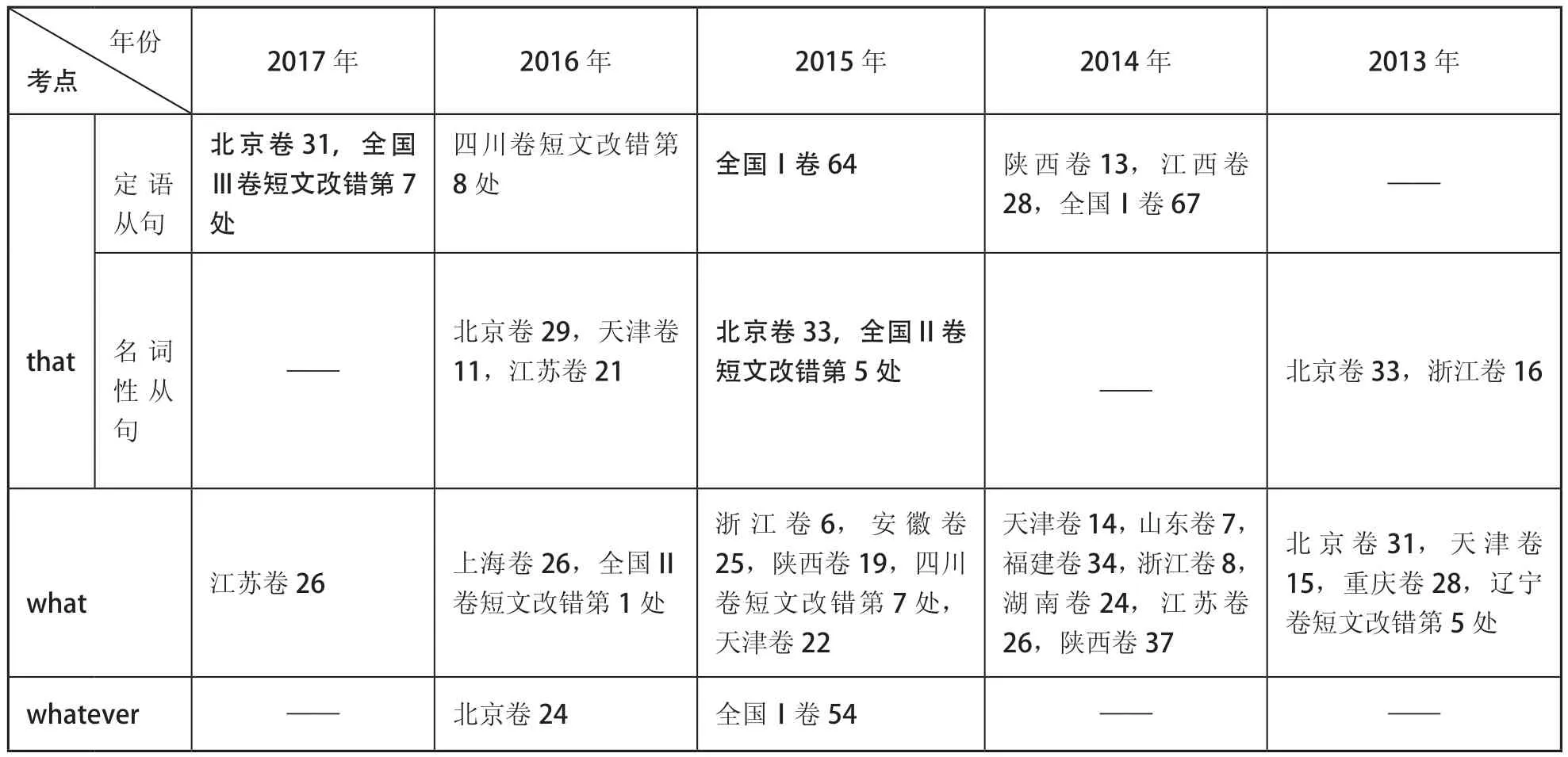从句中的that,what,whatever用法辨析
2018-07-24山东李秀萍
山东 李秀萍
that,what和whatever这三个引导词有同也有异,其中that和what是高考中考查的高频引导词,同时也是易混词,whatever是个较难理解也容易与that,what混淆的引导词,掌握这三个词的用法对于高考备考起着重要的作用。下面同笔者一起来看近五年高考试题中对于这三个引导词的考查:

年份考点 2017年 2016年 2015年 2014年 2013年定语从句北京卷31,全国Ⅲ卷短文改错第7处四川卷短文改错第8处 全国Ⅰ卷64 陕西卷13,江西卷28,全国Ⅰ卷67 ——that 名词性从句——北京卷29,天津卷11,江苏卷21北京卷33,全国Ⅱ卷短文改错第5处 —— 北京卷33,浙江卷16 what 江苏卷26 上海卷26,全国Ⅱ卷短文改错第1处浙江卷6,安徽卷25,陕西卷19,四川卷短文改错第7处,天津卷22天津卷14,山东卷7,福建卷34,浙江卷8,湖南卷24,江苏卷26,陕西卷37北京卷31,天津卷15,重庆卷28,辽宁卷短文改错第5处whatever —— 北京卷24 全国Ⅰ卷54 —— ——
从以上表格可以看出,在近五年的高考试题中,这三个引导词是相对重要的考查点。学习和掌握好这三个词的用法对于考生备考来说十分必要。那么,如何掌握它们各自的用法并加以区分呢?
首先,我们在佳句和歌词中感受一下that,what和whatever的用法。
佳句欣赏
1. If you talk to a man in a language he understands, that goes to his head. If you talk to him in his language, that goes to his heart.
如果你用一个人听得懂的语言与他交流,他会记在脑子里;如果你用他自己的语言与他交流,他会记在心里。
2. Whatever you do, do whatever you like.
无论你做什么,做你喜欢做的事。
3. All successful people have a goal. No one can get anywhere unless he knows where he wants to go and what he wants to be or do.
所有成功的人都有目标。如果一个人不知道要往哪里去,要成为怎样的人,要做什么,那他就将一事无成。
歌词欣赏
Wherever you go, whatever you do, I will be right here waiting for you.
无论你去哪里,无论你做什么,我都会在这里等你。
其次,在从句中如何准确使用这三个引导词呢?请看下文。
一、that
(一)阅读并分析下列例句中that引导的从句,归纳that 的用法(引导什么从句,在从句中是否作成分,有无意义,能否省略)
例1. That our team had won the match made us excited.
例2. The fact was that our team had won the match.
例3. The fact that our team had won the match made us excited.
例4. The headmaster said that our team had won the match.
例5. Everybody could see that Tom had won the match and that he was happy.
例6. The fact that the headmaster announced made us excited.
例7. The fact that is announced by the headmaster made us excited.
【用法归纳】
1. that引导主语从句(例1)、表语从句(例2)、同位语从句(例3)时,在从句中作成分,无意义,但通常不能省略;引导宾语从句(例4)时,在从句中不作成分,无意义,可以省略,若有两个或以上宾语从句(例5)时,第一个that可以省略,第二个或以后的that不能省略。
2. that引导定语从句时,在定语从句中作主语、宾语或表语,有意义,只有作宾语(例6)时可以省略,作主语(例7)或表语时不能省略。
(二)实战演练
1. 改错
(1)He came home late made his mother angry.
解析:句首加That,引导主语从句,在从句中不作成分,通常不可省略。
(2)The reason why he came late is because he got up late.
解析:because改为that,引导表语从句,在从句中不作成分,通常不可省略。
2.小试高考题
(3)(2016年天津卷)The manager put forward asuggestion _____ we should have an assistant. There is too much work to do.
解析:填that。 that引导同位语从句,在从句中不作成分,不可以省略。
(4)(2013年北京卷)Experts believe ______ people can waste less food by shopping only when it is necessary.
解析:填that。that引导宾语从句,在从句中不作成分,可以省略。
(5)(2017年北京卷)The little problems _______ we meet in our daily lives may be inspirations for great inventions.
解析:填that/which。that引导定语从句,在从句中作meet的宾语,可以省略。
(6)I refuse to accept the blame for something _____was someone else’s fault.
解析:填that。that引导定语从句,在从句中作主语,不可以省略,由于先行词是不定代词,故不能用which。
(三)用法延伸:that引导名词性从句的常用句型
1.that引导主语从句时,常用it作形式主语,以平衡句子,常见句型有:
(1)It + be +形容词(good,obvious,true,natural,surprising,possible,likely,certain,probable, etc.)+ that从句
例 1. It’s certain that he will do well in his exam.
(2)It + be +名词词组(an honor, no wonder, a pity, no surprise, etc. )+ that从句
例 2. It’s an honor to be invited to the big dinner.
(3)It+ be+过去分词(announced, believed, expected,decided, said, reported, thought, etc. )+ that从句
例3. It is reported that the next Winter Olympics will be held in China.
2.that引导宾语从句时,如果其后出现宾语补足语,为了平衡句子,通常会在补足语前使用形式宾语it,把宾语从句放在补足语后。其基本结构为“动词 + it + 宾语补足语(形容词 /名词词组)+宾语从句”, 常用于这种结构的动词有:believe, consider, find, feel, make, suppose,think等。
例4. We think it possible that we can achieve our goal with his help.
注意:在it后加上is或was即可构成一个宾语从句:We think (that) it is possible that we can achieve our goal with his help.
3.that引导表语从句时,主语常是抽象名词;that引导同位语从句时,常跟在抽象名词后,that从句用来解释抽象名词的具体含义。常用的抽象名词有:advice,belief,demand,dream,evidence,fact,hope,idea,information,message,news,order,promise,reason,reply,request,suggestion,thought,truth,wish,word等。
例5. I have a dream that I can travel all around the world when I grow up.(同位语从句)
例6. The reason why he is late is that there is a traffic jam on his way here.(表语从句)
二、that和what
(一)阅读并分析下列例句中what引导的从句,归纳what 的用法(引导什么从句,在从句中是否作成分,有无意义,能否省略)
例1. What it was to become was uncertain until between 4.5 and 3.8 billion years ago when the dust settled into asolid globe. (人教版,Book 3,P25)
例2. Well,why don’t you explain what this is all about?(人教版,Book 3,P18)
例3. About a month ago, I was sailing out of the bay...( his eyes stare at what is left of the brothers’ dinner on the table)(人教版,Book 3,P18)
例4. (2015年安徽卷)aship in harbor is safe, but that’s not what ships are built for.
例5. He has no idea what is waiting for him in the future.
【用法归纳】
1. what引导主语从句(例1)、宾语从句(例2、例3)、表语从句(例4)、同位语从句(例5),在从句中分别作主语、宾语或表语,有意义,不能省略。
2. what指代“事或物”时,同“The thing(s) + that /which定语从句”;what指代“地点”时,同“The place(s) + that / which定语从句”。
(二)实战演练
1. 单句填空
(1)____ we can’t get seems better than ____ we have.
(2)____ we cant’ get seems better than the things ____we have.
答案:(1)What; what (2)What; that
2. 改写t h a t引导的定语从句
(1)What he said surprised me.
改写:The thing that/which he said surprised me.
(2)I lived in what you call“Ancient Greece”.
改写:I lived in the place that/which you call“Ancient Greece”.
3.小试高考题
(1)(2017年江苏卷)We choose this hotel because the price for a night here is down to $ 20, half of _______ it used to charge.
解析:填what。what引导的从句作of的宾语,what在从句中作charge的宾语;half of...部分在句中作$20的同位语。
(2)(2014年浙江卷)“Every time you eat asweet,drink green tea.” This is ______ my mother used to tell me.
解析:填what。what引导表语从句,what在从句中作tell的直接宾语。
(3)______ was most important to her, she told me, was her family.
解析:填What。what引导主语从句,what在从句中作主语,she told me是插入语。
三、what和w hatever
(一)比较what和whatever的用法
1. What she did surprised me. 她所做的事令我吃惊。
2. Whatever you do, do whatever you like. 无论你做什么,做你喜欢做的事。
【不同点归纳】
第一句中的what指代说话者心目中的“具体事或物”,引导名词性从句,同“The thing(s) + that / which”;第二句中的第一个Whatever指“无论什么”,引导让步状语从句,同“No matter what”,第二个whatever泛指“任何事或物”,引导宾语从句。whatever引导名词性从句时等同于“anything + that”。
(二)实战演练
1. 单句填空
—What should I wear to attend his wedding party?
—Dress __________ you like.
解析:whatever,引导宾语从句,意为“穿任何你喜欢的衣服”或“你喜欢什么就穿什么”。
2. 翻译
Whatever the reason, my urban hellos were answered far less often than my rural ones.
解析:无论什么理由,我在城里打招呼得到的回应比在乡村少得多。完整的句子是“Whatever the reason is”,Whatever引导让步状语从句,等同于“No matter what”。
3.一句多译
无论多么困难,我们都能克服。
Whatever difficulties,we could overcome.
No matter what difficulties,we could overcome.
However difficult,we could overcome.
No matter how difficult,we could overcome.
4.小试高考题
(2016年北京卷)Your support is important to our work. ______ you can do helps.
解析:Whatever,引导主语从句,表示“你做的任何事都会有所帮助”。
尽管that,what和whatever引导从句时既有相同点又有不同点,但万变不离其宗,只要掌握各自的基本用法,就能很好地将其运用。平日阅读时,教师要引导学生只要遇见从句就去判断是什么从句,学生就会逐渐地练就火眼金睛,遇到相关从句时,马上就能识别出来,从而准确领会句意,更能在书面表达中轻松驾驭定语从句和名词性从句,写出高水平的句子,取得高分。
